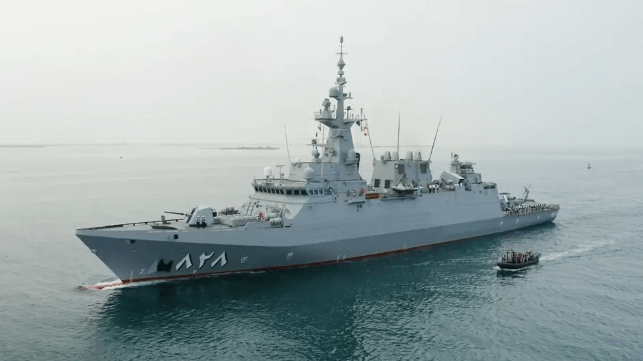New Red Sea Security Coalition Has 10 Secret Members

When the Pentagon announced Monday that it had formed a new maritime security coalition for the Red Sea, it provided a measure of reassurance that commercial shipping would have more protection from Yemen's Houthi rebel faction. It also provided a new set of unknowns: the coalition's rules of engagement, its interaction with merchant shipping, the military assets on scene, and the members of the partnership.
The 10-nation membership list appeared to be known until Wednesday, when National Security Council spokesman John Kirby confirmed that another 10 unnamed nations are also in the coalition. Some of these secret members are Arab governments that do not want to be seen defending Israeli shipping, according to Politico's Lara Seligman, who first broke the story. (Limited polling suggests that the Israeli operation in Gaza has made pro-Israeli politicians much less popular in the Arab world.)
"I'll leave it up to them to be able to describe it one way or another since - because not all want to become public. I doubt you're going to get much more out of them," the NSC's John Kirby said at a press conference.
The extent of the coalition's willingness to take action is also unknown. So far, the rules of engagement for the U.S. Navy and its partners have been limited to defensive measures to take down incoming drones and missiles, deter would-be waterborne boarding parties, and defeat hijacking attempts. Even after addressing dozens of airborne threats at a cost of up to $2 million per intercept, the forces on station in the Red Sea have not struck back against Houthi launch sites on shore. Media sources have reported a general reluctance to strike at the Houthi rebels because of the risk of upsetting their Iranian sponsors.
"The rules of engagement will be configured to allow the ships to defend shipping against surface and air threats. Taking the fight to the Houthis ashore will be for a different operation," said maritime security consultant Capt. Gerry Northwood, speaking to Reuters. "So, industry will have to lump it."
The coalition's interactions with shipping have also been limited so far, and insiders have expressed uncertainty about the degree of protection that it will provide. In the interim, global carriers continue to divert ships away from the Suez Canal-Red Sea shortcut and send them the long way around Africa's southern tip.

that matters most
Get the latest maritime news delivered to your inbox daily.
"We don't know exactly how many warships will be involved, how long it will take those vessels to get to the region, or their rules of engagement and the actual protection scheme that will be put in place," Dryad Global CEO Corey Ranslem told Reuters.
For their part, Houthi leaders say that the coalition has no chance of stopping the attacks. "Even if America succeeds in mobilizing the entire world, our military operations will not stop unless the genocide crimes in Gaza stop and allow food, medicine, and fuel to enter its besieged population," said Houthi political leader Mohammed Al-Allah in a statement on social media.
